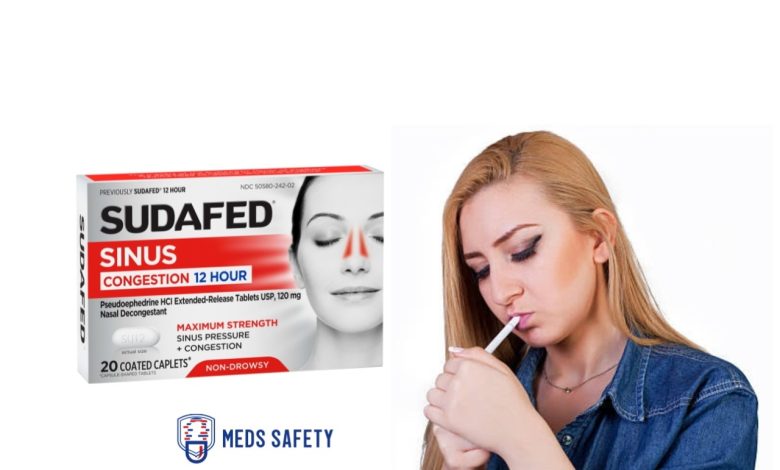The 5 Dangers of Smoking Crushed Sudafed

The abuse of over-the-counter medications has been a growing concern in recent years. Among the many substances misused, Sudafed, a popular decongestant, is no exception. While Sudafed can be an effective remedy for nasal congestion when used as directed, it can become a dangerous and harmful substance when abused, especially when it is crushed and smoked.
In this article, we will explore the dangers of smoking crushed Sudafed, shedding light on the severe health risks associated with this dangerous practice.
What is Sudafed?
Sudafed, also known as pseudoephedrine, is a widely available over-the-counter medication used to relieve nasal congestion due to colds, allergies, and other respiratory conditions. Its primary function is to constrict blood vessels in the nasal passages, reducing swelling and congestion to provide relief. Sudafed comes in various forms, including tablets, capsules, and liquids, and it is generally safe when used as directed by a healthcare professional or as indicated on the packaging.
The Dangers of Smoking Crushed Sudafed
1. Toxic Chemicals: Smoking crushed Sudafed exposes individuals to a range of toxic chemicals that are harmful to the respiratory system and overall health. When heated and inhaled, pseudoephedrine can produce toxic fumes that irritate the lungs and cause respiratory problems. The chemicals released during this process can damage the delicate tissues of the respiratory tract, leading to severe health issues over time.
2. Health Risks: Smoking Sudafed can result in immediate and long-term health risks. Short-term effects may include lung irritation, coughing, and difficulty breathing. In the long term, chronic inhalation of crushed Sudafed can lead to more serious conditions such as bronchitis, pneumonia, and even lung cancer.
3. Addiction and Dependency: Pseudoephedrine, when abused through smoking, can be psychologically and physically addictive. Users may experience a sense of euphoria and increased energy, which can lead to repeated use. This can quickly spiral into a harmful cycle of addiction and dependency, making it challenging to quit.
4. Legal Consequences: The misuse of Sudafed, especially in ways that are not in accordance with its intended use, is illegal in many jurisdictions. Law enforcement agencies actively monitor and regulate the sale and distribution of pseudoephedrine due to its potential for abuse in the production of illegal drugs like methamphetamine. Those caught engaging in the misuse of Sudafed may face legal consequences, further compounding the dangers of this practice.
5. Health Complications: Smoking crushed Sudafed is not only hazardous to the respiratory system but can also lead to a range of other health complications. These may include cardiovascular issues, high blood pressure, nervous system problems, and even overdose in extreme cases.
If you or someone you know is smoking crushed Sudafed or struggling with substance abuse, it’s important to seek help promptly. Substance abuse can have serious health and legal consequences, and addressing the issue is crucial for your well-being. Here are steps you can take to get help:
1. Acknowledge the Problem: The first step in getting help is recognizing that there is a problem. Be honest with yourself or the person you’re concerned about regarding the misuse of Sudafed or any other substance.
2. Talk to a Trusted Person: Share your concerns with a trusted friend, family member, or mentor. Opening up about the issue can provide emotional support and encouragement to seek help.
3. Consult a Healthcare Professional: Schedule an appointment with a healthcare professional, such as a primary care doctor, psychiatrist, or addiction specialist. They can assess your situation, provide medical guidance, and recommend appropriate treatment options.
4. Reach Out to Addiction Helplines: In many countries, there are addiction helplines available 24/7 where you can speak to trained counselors who can offer guidance and support. They can also provide information on local resources and treatment facilities. Consider calling a helpline like the National Helpline for Substance Abuse and Mental Health Services in the United States at 1-800-662-HELP (1-800-662-4357).
5. Locate a Support Group: Support groups, such as Narcotics Anonymous (NA) or SMART Recovery, can be valuable resources for individuals struggling with substance abuse. These groups provide a safe and non-judgmental environment for sharing experiences and seeking help from peers who understand what you’re going through.
6. Consider Professional Treatment: Depending on the severity of the substance abuse problem, professional treatment may be necessary. Treatment options may include:
a. Inpatient Rehabilitation: This involves residing at a treatment facility for intensive therapy and medical supervision.
b. Outpatient Programs: These programs offer therapy and support while allowing individuals to continue living at home.
c. Counseling and Therapy: Individual or group therapy sessions can help address the underlying issues contributing to substance abuse and develop coping strategies.
d. Medication-Assisted Treatment (MAT): MAT may be recommended in cases of opioid addiction and involves medications prescribed by a healthcare professional.
7. Develop a Support Network: Surround yourself with a supportive network of friends and family who are understanding and committed to helping you in your recovery journey. Building a strong support system can be essential to maintaining sobriety.
8. Avoid Triggers: Identify and avoid situations, places, or people that trigger the urge to misuse substances. Making positive changes in your lifestyle and environment can help you stay on the path to recovery.
9. Stay Committed: Recovery from substance abuse is a journey that requires commitment, patience, and resilience. Set realistic goals and take it one day at a time.
10. Seek Legal Advice: If you are facing legal consequences due to substance abuse, consult an attorney who specializes in criminal law. They can provide guidance on legal options and defense strategies.
Conclusion
Smoking crushed Sudafed is a dangerous and harmful practice that poses severe risks to one’s health. While Sudafed can be an effective remedy when used as directed to alleviate nasal congestion, its abuse through smoking can result in toxic chemical exposure, addiction, legal trouble, and a host of serious health complications.
It is essential to recognize the dangers associated with misusing over-the-counter medications and to seek help if you or someone you know is struggling with substance abuse. Seeking assistance from healthcare professionals and support networks can provide guidance and resources for overcoming addiction and avoiding the hazardous path of smoking crushed Sudafed. Ultimately, it is crucial to use medications responsibly and according to their intended purpose to protect your health and well-being.





